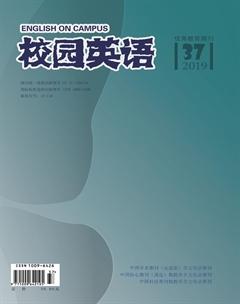Reflections On Children’s English Enlightenment Education
【Abstract】Researches on childrens language learning shows that children learn language most rapidly in infancy. This article mainly discusses the application of natural mother tongue acquisition, misconceptions on childrens English enlightenment education, and measures to promote the development of childrens English enlightenment education.
【Key words】enlightenment education; misconceptions
【作者簡介】刘艳君,兰州理工大学技术工程学院。
Nowadays, English has become a compulsory course for every child. Researches on childrens language learning shows that children learn language most rapidly in infancy. The latest scientific research shows that the earlier children are exposed to foreign languages, the stronger their ability to absorb foreign languages.
1. Application of Natural Mother Tongue Acquisition
Acquisition refers to the natural use of a certain language and the gradual and subconscious development of this ability by the speaker in the daily communication environment. One of the differences between human beings and other animals is that human beings have language acquisition device. The acquisition of mother tongue by children in a few short years is a full manifestation of natural mother tongue acquisition, which is actually a process of listening before writing. Generally speaking, the process of natural mother tongue acquisition involves a sufficient amount of language input, then a certain amount of scene accumulation, and then a correct language output. The acquisition of natural mother tongue can also be applied to the learning of a second foreign language.
2. Misconceptions on Childrens English Enlightenment Education
There are many misconceptions in the society and parents of infants and young children about English enlightenment education, which are shown as follows:2.1 Most parents think their children are too young to master a second language other than their mother tongue. The reasons are: Too early English enlightenment will confuse children with foreign languages and Chinese Pinyin. In fact, in the process of learning a second language, the childs brain will distinguish and store different language signals entering the brain. When exposed to different language signals, children will automatically separate clearly defined areas in their minds. They will not confuse the languages.
2.2 English enlightenment is not to let parents teach their children English, but to let parents accompany their children to learn English. Now many parents feel that their children are lack of a language environment, so they send them to training institutions, which usually only set up courses twice a week, and the longest period of a class is only two hours. In such a short period of time, what children can learn is very little. Now the original English learning resources are everywhere, which means that most parents have the objective conditions to enlighten English.
3. Measures
3.1 Selecting excellent English textbooks that are suitable for children. will greatly affect childrens interest in English learning. Educational research and management departments can give appropriate macro guidance to all kinds of English teaching materials, urge all kinds of English enlightenment education institutions to analyze and study all kinds of English teaching materials, and finally choose high-quality English teaching materials suitable for childrens learning and embodying advanced educational concepts.
3.2 In the teaching process, give full play to the influence of games, music, fairy tales, etc. on arousing childrens enthusiasm and subjectivity in English learning, so that children can fully experience the fun of learning English in entertainment activities, and can have emotional resonance with teachers in the interactive process, instead of only letting children memorize words and sentences passively and dully.
3.3 Teaching quality largely determines the overall level of English education. As a result, English teachers should improve their English professionalism from the aspects of teaching ability, professional knowledge and professional accomplishment.
4. Conclusion
As the worlds common language, English plays an important role in social economy, trade, science and technology, communication and other aspects, and English education runs through the whole learning process of childrens pre-school, primary school, secondary school and even university.

